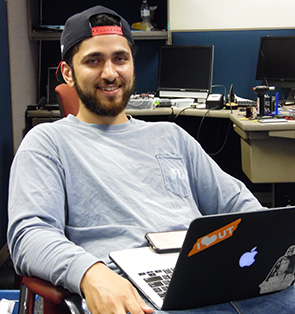| |
Knoxville student researches high altitude spacecraft test platform development in North Dakota
JULY 23, 2016 at 2:21 p.m.
It was not what I expected. I learned about the integration of software and hardware – about its fabrication, development and CAD software - Ardlan Khalili, Knoxville
| |

|
GRAND FORKS, NC – When students considering careers in spacecraft software development think of where to get a degree, North Dakota may not be the first place that comes to mind. But maybe it should. For the last two years, students from across the country have come to the University of North Dakota in Grand Forks to participate in a ten-week intensive Research Experience for Undergraduates program where they learn how to research and develop software that may one day fly on the OpenOrbiter CubeSat, which will be launched into Earth orbit later this year.
“Developing software for a small spacecraft presents many challenges,” commented OpenOrbiter Small Spacecraft Development Initiative director Jeremy Straub. “You have limited computing capabilities and a need to develop optimized code, as the when the processing is running its consuming very valuable power resources that could be used to power other parts of the satellite. It’s not like programming for a desktop, where in many cases you have far more resources that you need for an application – it drives you to make the best possible use of the resources.”
By participating in this National Science Foundation and Department of Defense-sponsored program, students learn development best practices. When in space, you can’t just walk over and reboot the satellite if a program crashes. Faulty code can mean that a mission is not able to complete all of its goals – or even that the satellite stops working altogether. This provides a real incentive for checking the code and helps to drive home the lessons that students have learned in their coursework. Students also get an opportunity to try their hand at performing real-world research. They choose a topic with their mentor and set off to explore the unknown.
“It was not what I expected. I learned about the integration of software and hardware – about its fabrication, development and CAD software,” said current-year participant Ardlan Khalili from Knoxville, Tenn. “I also learned a lot about the Raspberry Pi computers.”
Khalili spent the past nine weeks developing and integrating the hardware and software for a small satellite test platform called BalloonSat. This system is designed to mirror aspects of the CubeSat design to allow for data collection and software testing prior to the launch of a satellite in to space. In addition to its testing value, the BalloonSat platform can serve as a very-low-cost tool for science, technology, engineering and math (STEM) educators who cannot afford to build a satellite.
In addition to the knowledge and experience he gained from participation, Khalili is working to receive academic credit through his own university for the experience. During the experience, Khalili and two of his collaborators on this project travelled to St. Paul, Minnesota where they had the opportunity to present a paper they wrote about their BalloonSat design work at a High Altitude Ballooning conference.
In addition to their research work in Grand Forks and conference travel, student participants traveled to the NASA Johnson Space Center in Houston, Texas where they got to see space software research in action. While there, they met the International Space Station’s RoboNaut robot and learned about software development and testing for space applications.
Students are selected for admission to the program based on their current skillset and the value that they show the program will have for them. “It is our hope that this experience opens their eyes as to the multitude of possibilities that their degree affords them,” commented Computer Science Department chairperson Ronald Marsh. “Many of the participants would not have any such opportunity otherwise.”
The OpenOrbiter Small Spacecraft Development Initiative at the University of North Dakota is working to launch North Dakota’s first spacecraft. The CubeSat being developed will demonstrate the ability to make a functional spacecraft for only a few thousand dollars (instead of tens or hundreds of thousands). A largely student-driven effort, OpenOrbiter is changing who has access to space by providing a low-cost, easily customizable framework for others to use as the basis for their own satellite.
Published July 23, 2016 |

